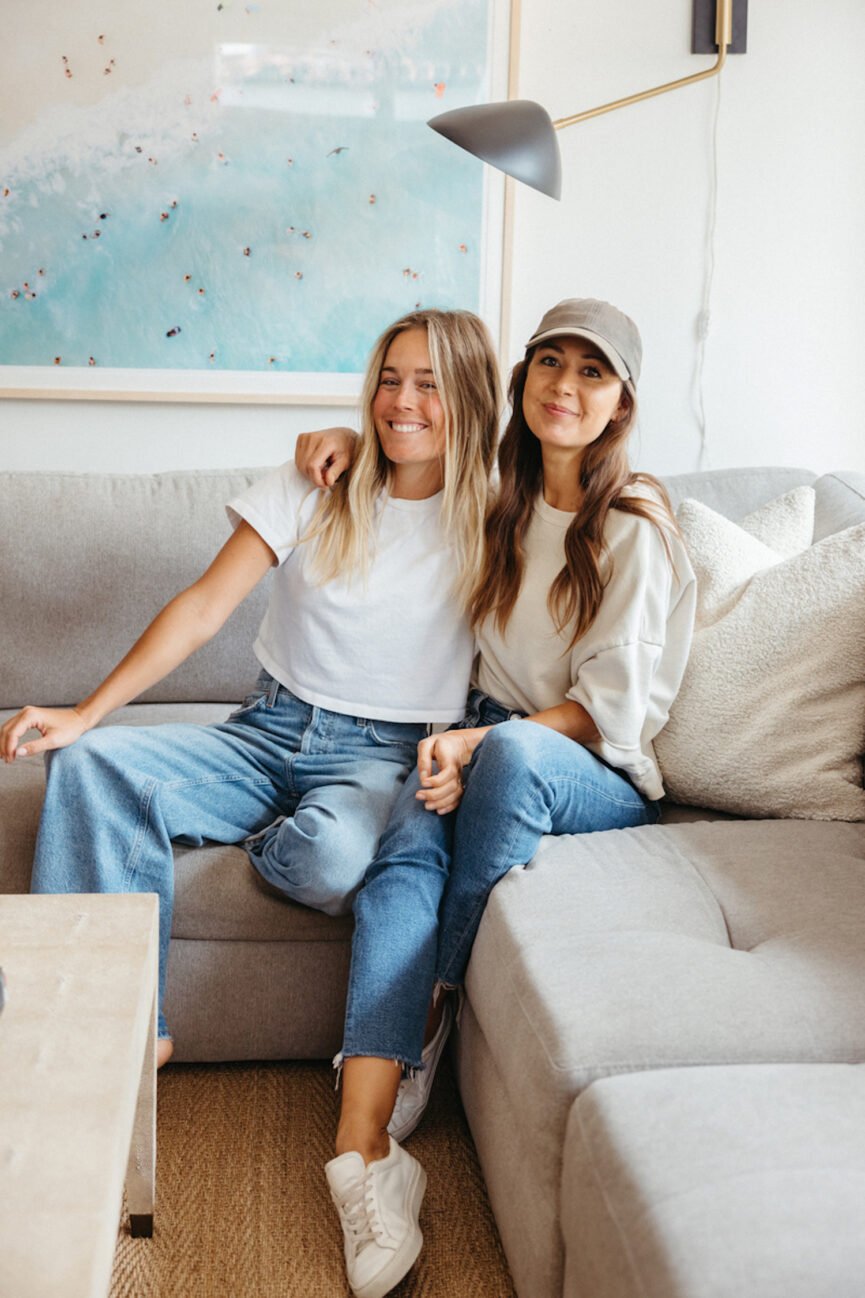
I spent the first day of the new year doing what I always do: gathering inspiration and gluing it down. Vision boarding, for me, is less about setting goals and more about paying attention—an invitation to notice what I want to feel more of. As I flipped through my collection of magazines and scrolled Pinterest, a few images kept appearing: a bike ride through the European countryside. A library spilling into a garden. A rooftop dinner, golden-hour lit, with friends leaned in close and laughing. None of them pointed to a shinier version of myself. Instead, they offered a reminder of something quieter and far more essential: This year, I want to remember how to be a better friend.
The realization was quiet but insistent: I have strong friendships, many of them deeply rooted and long-standing. I’ve built a circle I’m proud of—friends who live down the street and friends who live continents away. But I began to notice the ways I’d started showing up in half-measures. A reply later, a reschedule here, a slow erosion of the little rituals that once made our friendships feel sacred. In a season where so much of my energy has gone toward work, my family, and self-growth, I’d let friendship be the thing that happened if I had time left over. And I don’t want to live that way anymore.


How to Be a Better Friend: A Gentle Wake-Up Call
So this year, I made a quiet, specific intention: to be a better friend. Not by overhauling my life or packing my calendar—but by weaving care into what already exists. By becoming someone who remembers, who initiates, and who gathers. Someone who makes connection feel easy and sacred again. This is about how I’ve restructured my week around friendship, yes, but more importantly, it’s about what happens when you choose to show up not just for your friends, but with them. Fully present. Wide open. All in.
1. Ask Yourself What Friendship Means to You Now
In my 20s, friendship often looked like proximity. It was who lived down the hall, who showed up unannounced with wine, who stayed too late talking on the kitchen floor. It didn’t require much planning—just presence, and a little serendipity. But somewhere along the way, things shifted. We got jobs and partners, some of us had babies, and many of us moved. (Me, always.) Now, my closest friends are scattered across time zones. And while there’s something beautiful about loving people all over the world, it also requires more intention. The drop-ins have become scheduled calls. The casual hangouts, calendar invites. Friendship in this season of life asks for something deliberate.
That shift felt sad to me at first—like spontaneity had been traded for structure. But I’ve come to see it differently. What makes a friendship meaningful isn’t how often you see someone, but how consistently you choose to show up for them. It’s the text that says “thinking of you” with no expectation of reply. It’s mailing a postcard from a place you know they’d love. It’s knowing their mother’s name, their deadline, their dog’s surgery. When I think about how to be a better friend, I think about attention. Friendship, I’ve realized, isn’t something casual. It’s something sacred. And like all sacred things, it deserves to be cared for with reverence.
What makes a friendship meaningful isn’t how often you see someone, but how consistently you choose to show up for them.
2. Rework Your Week to Make Space for Connection
I used to think I just didn’t have time. Between work, workouts, errands, and the daily habits that keep me sane, it felt like friendship had to wedge itself into the margins of my schedule. But when I really looked at my week, I realized I had time—I just wasn’t treating friendship as essential. So I started planning for it the way I plan for everything else. I added it to my calendar. I created small rhythms that made connection feel effortless instead of overwhelming.
One of the simplest changes was something I call “Friendship Fridays.” It’s a 10-minute window I block off every Friday morning to send a voice note, a meme, a little update to someone I love. No pressure to meet up or make plans—just a soft touchpoint to say, I’m thinking of you. I also started paying attention to the natural pauses in my week—my afternoon walks, my evening stretches—and inviting connection into those moments. A quick call while folding laundry. A text while waiting for water to boil. Friendship doesn’t demand hours—it just asks for intention. And when I stopped treating it like a luxury and started treating it like nourishment, something shifted.
3. Create Rituals To Make Friendship Feel Sacred
It started with something small: a handwritten card, mailed on the first Sunday of every month. I’d light a candle, make a cup of tea, and sit down with a stack of postcards I’d collected over the years. Sometimes I wrote a full letter. Sometimes it was a sentence or two, but these tiny gestures became less about keeping in touch and more about saying: You still live in my life. They turned friendship into a practice—less performative, more devotional.
Other rituals followed. A shared playlist with my best friend in London, updated quietly whenever a song reminded us of a trip or a season or a boy we once loved. A standing Sunday dinner with the friends who live nearby, where we rotate hosting and always cook something nostalgic—pasta we made in college or the salad that feels like summer. None of it is perfect or polished. But maybe that’s the point. Friendship doesn’t ask for grandeur. It asks for presence, for rhythm, for care. These rituals don’t take much, but they make everything feel a little more sacred.
Friendship doesn’t demand hours—it just asks for intention. And when I stopped treating it like a luxury and started treating it like nourishment, something shifted.
4. Get Comfortable With Repair and Reciprocity
There’s a particular kind of ache that comes from a neglected friendship. Sometimes it’s circumstantial—life got busy, someone moved, a season shifted. But often, there’s something unspoken beneath the surface: a missed milestone, a slow fade, a silence neither person knew how to break. I’ve been on both sides. I’ve dropped the ball and felt guilty about it. I’ve been hurt and stayed quiet. And for a long time, I let those moments define the relationship rather than try to repair it.
But here’s what I’ve learned: Real friendship can hold more than just the good parts. It can stretch. It can be mended. And choosing to repair (even clumsily) is a way of saying, you still matter to me. I started having the conversations I used to avoid: I’m sorry I wasn’t there the way I wanted to be. Or, I miss you, and I wasn’t sure how to say it. I also started being more honest about my needs—not in a way that demanded, but in a way that invited care: Can I vent for five minutes without fixing it? Or, I’d love to feel a little more supported right now. Friendship doesn’t thrive in perfection. It thrives in reciprocity. And when I stopped trying to get it all “right” and started trusting that my friends could meet me in the mess, everything softened.
What I’ve Learned About How to Be a Better Friend
Here’s the simple truth: Friendship is less about doing more, and more about showing up with care. These small shifts have helped me make space for the people I love and deepen the relationships that matter most.
- Schedule friendship like self-care. Add it to your calendar, not as a chore but as something nourishing.
- Reach out, even when it’s been too long. The best time to say I miss you is now.
- Let go of guilt. Friendships have seasons. Honor where you are, and move forward with love.
- Offer without keeping score. Sometimes you’re the one giving more. Sometimes you’re not. Let that ebb and flow.
- Don’t underestimate a voice memo. Or a song. Or a postcard. Little things leave an imprint.
- Celebrate your friends’ wins. Loudly! Be the one who claps the hardest.
- Ask better questions. “How are you really doing?” will always matter more than “What’s new?”
Friendship as a Form of Beauty
We spend so much time trying to improve ourselves—our careers, our bodies, our homes. But what if we put that same care into our friendships? What if we made them feel essential, beautiful, worthy of effort?
Friendship isn’t something to optimize—it’s something to honor. In 2025, I’m choosing to make my friends feel seen. Not someday, but this week. Not perfectly, but with intention. And always with care.
The post The 10-Minute Weekly Habit That’s Transforming My Friendships appeared first on Camille Styles.
Camille Styles









